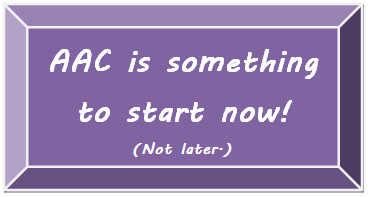AAC: No good reason to wait!
I participated in an online conference last month, which consumed the better part of two weeks (one of the reasons the blog has been a bit quiet of late). The topic was on teaming with other professionals to improve communication for individuals with complex communication needs. During a panel discussion/case study, someone raised the question: as a field, have we moved beyond the [incorrect] belief that there are "prerequisites" for AAC (augmentative/alternative communication)? One of the panelists responded that we have made progress, but unfortunately there are still so many that view AAC as something to be earned, or even worse, as a last resort. Her reply included this:
"...AAC is a means to an end, not the end and not the last resort ... Not the thing we turn to in the end, but something we can start with..."
While I am glad I participated, the online conference was a mixed bag for me. It was wonderful to learn (or have reaffirmed) information supported by research and experience. I even made an effort to share some of my 'take aways' via social media! At the same time, it was frustrating to be reminded (so poignantly) how far we have to go in spreading that knowledge. Funding sources (e.g. insurances), doctors, families, teachers, administrators, professionals in many different fields, and yes even other speech-language pathologists.
Yesterday a parent posted a question in an online group. Her young child just received a probable diagnosis of apraxia. The neurologist explained that they would need to see a specialist to confirm the diagnosis  and then they can choose to attempt speech therapy and see if the child progresses and if s/he doesn't they can look at alternative forms of communication. This parent was understandably confused. Why must they choose? Why was it presented as an "either/or" scenario? How do you choose? Whether or not that was the doctor's intended message, that is the message the parent understood. Sadly, that doctor became the "communication police" directing to one path or the other, but not both.
and then they can choose to attempt speech therapy and see if the child progresses and if s/he doesn't they can look at alternative forms of communication. This parent was understandably confused. Why must they choose? Why was it presented as an "either/or" scenario? How do you choose? Whether or not that was the doctor's intended message, that is the message the parent understood. Sadly, that doctor became the "communication police" directing to one path or the other, but not both.
When it comes to speech, language...COMMUNICATION, we need enablers, not gatekeepers. We need to be providing more opportunities, not less. Of course we would ideally like to see every child successfully using speech to communicate. Unfortunately, some kids need to work long and hard at speech production skills (and may not get to a place where oral language can be their primary means of communication). Why would we sacrifice their language development and right to communicate their needs, wants, thoughts and feelings while we "wait and see" and work on speech? Speech is not communication. Speech is one means to communicate. As is: writing, texting, emailing, signing, gesturing, and using picture symbols.
AAC does not inhibit the development of speech production skills. Have you ever tried communicating for a day just using AAC (no speech)? It is hard work! And takes longer. We humans like to do things the easiest way possible. If we can talk, we are going to talk. The beauty of AAC is that we know (from research and experience) that AAC can actually promote speech skill development, and definitely helps language skill development and communication, as well as reduces frustration! The two interventions work well together.
The end-goal is communication. Implementing AAC is not giving up. It is realizing that our loved ones deserve the right to express their thoughts, dreams, feelings, stories, wants and needs NOW - and to be understood NOW. AAC is a means to that end-goal. There is no good reason to wait on implementing AAC with a child (of any age) struggling to communicate. And there are a plethora of reasons to start AAC immediately. Be a communication enabler.

 Sunday, July 13, 2014 at 11:46AM
Sunday, July 13, 2014 at 11:46AM  Post a Comment →
Post a Comment →  AAC,
AAC,  communication,
communication,  language,
language,  speech | in
speech | in  AAC
AAC
Reader Comments